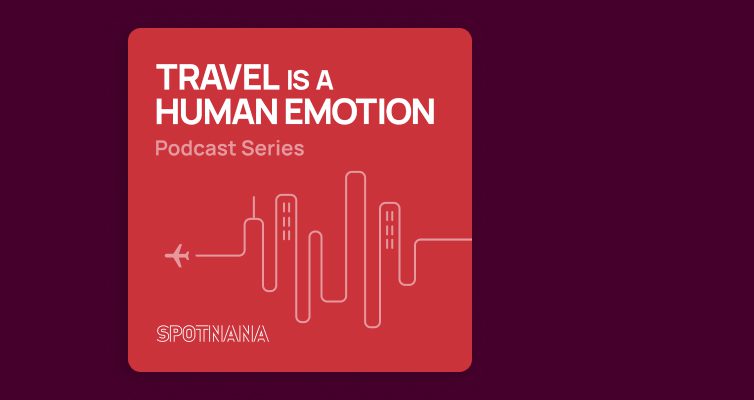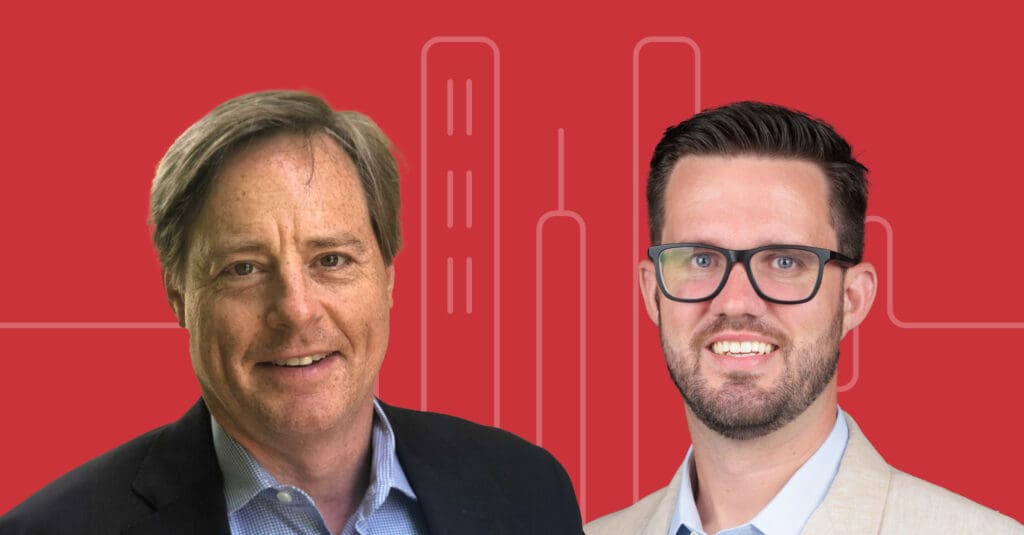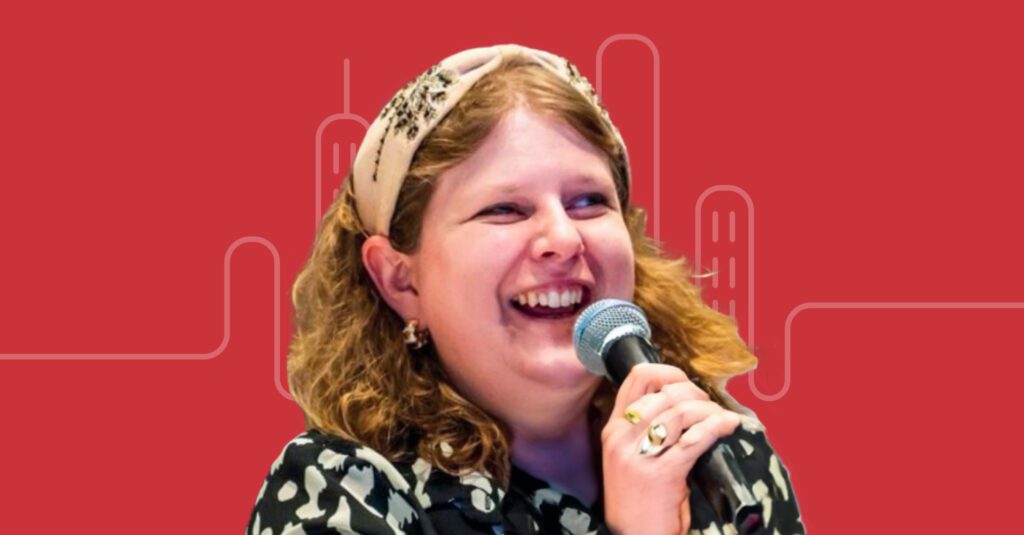Discussing distribution and sustainability with Parexel’s Ben Park
Guest: Ben Park, Executive Director of Travel & Sustainability at Parexel and Chair of GBTA Europe’s Advisory Board
Host: Johnny Thorsen, VP of Business Development for Content Distribution at Spotnana
Length: 26:12
Ben Park joins Johnny Thorsen to discuss the evolution of travel programs in 2024, the growing importance of sustainability in corporate travel, and the impact of innovative technology on the business travel experience.
Ben Park: If I look at corporate travel, I think the biggest challenge at the moment is the way distribution commercially works with travel agencies, airlines, hotels, car rental suppliers. It causes a lot of disruption. It prevents innovation. It makes our industry look not as good as we are.
Johnny Thorsen: Ben, you are the executive director of travel and sustainability with Parexel. The goal with this series is to have a completely, relaxed, informal conversation with a number of global travel buyer leaders like yourself and reflect a little on where we are as we enter ‘24.
What topics do you think will be most important, most relevant, most change enabling and, how do you reflect on 2023? As you’ve come out of that now and you look in the rear mirror. Hopefully you’re up for a little chat about that. And you decide if you don’t want to go into certain topics, complete content control on your end.
Ben Park: Okay. Let’s try to look into the future. We’re definitely not shy of topics, I guess.
Johnny Thorsen: No. And that’s actually a perfect opening statement, right? Because, if I look at my own career and travel technology, I think we are entering a year with incredible potential for change. That does not mean it’ll happen.
And certainly not everything will happen, but if you look at where you are and what your focus is going to be in, in 2024, which topics stand out as most important or promising for you?
Ben Park: For me, the challenge this year, especially, and I’m trying to, to put this into a picture, it’s like the scissor, the difference, the gap is getting larger and larger between what is possible in the market and the reality of what we’re having on tools. And I think this year, especially what I see, is how do you balance to make progress on topics, which are old problems we are still fixing or haven’t fixed for 20, 30 years? And we still need to fix the basics. So stuff we could have done the last five years, but it’s still, it’s not there in the travel industry. And on the other side, all the new stuff with AI, with Chat GPT, with whatever is out there, then new NDC stuff coming. So how do you not get lost in all the potential when I still need to build my foundation? I can do maybe one of these nice things and add-ons. But I need to focus on the foundation and I have all this stuff I can enhance, but it needs to work together.
I don’t know if that makes sense, but I think you almost need an IT consultant to help you build a strategy. Otherwise you will be lost. That’s my internal interpretation of this year.
Johnny Thorsen: That’s actually, that’s a very good observation, right? Because you cannot just spend all your time on the new things if you know that, like you said, you have a foundation with problems.
So have you decided what your kind of split of time will be on foundation versus innovation, or are you going to see how the year shapes up?
Ben Park: No, I think we might follow a lot of like what a lot of travel managers do is focusing this year on distribution on air distribution.
Because it’s still one of the highest cost and the most visible one and where the gap is surfacing every week. And I think that’s why for me foundation is distribution. How do I get content? How is it displayed? How can I pay for this? How is it working with, with reporting, invoicing? So a lot of back office system stuff, which is to me still foundation because it’s not that visible.
Distribution, air distribution is a key thing. The second element is what I put under traveler experience is using the data we have to show, I know the traveler, you are not just a number, a random person calling, logging in again. We know you, we know the behavior. So to me, it’s the two elements.
One is fixing a gap on distribution. And second is using the data and intelligence, especially in corporate travel, to show that I know you as a traveler and have a hopefully better experience. So some not so visible stuff where distribution, we will not get any credit for fixing something which is broken, but we might get some credit for the experience.
So this is kind of what I put my bet on for this year.
Johnny Thorsen: No, good strategy. Just looking at those two core problems you described there, because travelers expect more personalization. They’ve heard about it for years and they haven’t really seen it because the tools that they have access to have not really changed.
So, but at the same time, you do need the content to be right and be relevant before you can even add personalization.How are you going to manage both yourself. Are you having a specialist focusing on experience or distribution? Well, what’s your strategy?
Ben Park: On distribution? I guess the best at the moment is to use the network, connect with people on best practices, which pilots are working. I would think most of the consultants also are just like watching what’s happening on the market and to network and as quickly as possible see that you can run pilots and test stuff.
This is what we do mostly in house plus network. And on the experience side, this is where I think that at least for us, it’s essential to work with the travel agency, which is for us still a key player for technology strategy and with large OBT providers together. So getting the two key players in a way in the old world together and then see what’s possible there with their resources and our resources.
Yeah, but distribution is challenging because there is, um, especially I feel there’s a lot of news out there where it’s not 100 percent the true story. It’s a little bit each airline has its agenda, which is okay. Good. But I think at least for me as a travel buyer, it’s very hard at the moment to figure out what’s possible in reality for which country in which airline on distribution and what is still just like a pilot.
And I think that’s what we’re all looking forward to understanding. Okay, what is possible to copy into my ecosystem and where is it just a very specific pilot, which doesn’t work to me, or it means I need to do drastic changes to my program. But yeah, it’s hard to find out the truth at the moment.
Johnny Thorsen: And I have to say, just observing all the announcements from the airlines about when they announce a surcharge, then they delay the implementation of that surcharge. Then they change whatever the surcharge is going to be, and then they delay it again. I can see why as a buyer it’s really hard to make a qualified decision about when to either switch over or at least take advantage of because it seems to be a moving goal all the time.
Ben Park: Yes, absolutely. And what I heard recently is even like for some who are having pilots already and they’re looking at the total processing cost of basically old world GDS, its effect against an NDC, and then all the additional current TMC cost. And if they add all the additional costs downstream together, it’s the same as the old world distribution cost.
So if you just try in the old world, to get the NDC pipe in, but keep the old travel agency processes, you’re ending up with the same additional cost. It’s just eaten at other stages in your process. So to me, this is not a solution. I’m just moving a problem from one end to another, and I’m not addressing the other key issues. So that’s why it’s challenging. Yeah.
Johnny Thorsen: Yeah. And of course this is by no means a Spotnana promotion conversation, but, we know one of our advantages is that we’re not moving from an old way of doing things to a new way. We are just starting fresh with a new way of doing it, which at least means, a number of things become easier.
Just going back to an event that happened in 2023, when you were on stage in London at the Business Travel Europe Show, and if you don’t want to answer it, just ignore it. Did you end up having access to NDC content in your program? Because, at the Business Travel Show in London, you make that kind of statement that you thought you had to do. So where did you end up, at the end of the year?
Ben Park: Yeah, so I can answer part of this. Yeah. In Europe and some markets, we have NDC content within an aggregator, which, in a way, gives us access, but it’s not perfect. So to me, it’s an interim solution working with aggregators, but it’s good to get an idea and to see how much content is then going through the new pipe and how much is going to the old? We also did a pilot on one carrier with long-haul. And we’re looking at, especially at, continuous pricing or whatever, the right phrase for this. I’m always getting caught by how Lufthansa phrased it.
I know it’s not the industry term, but whatever the industry term is for this, um, continuous pricing or whatever. We were not seeing as much benefit as we expected on this element. So in Europe we had some pilots partly some good, some were not as good as we expected in, in the U.S., we didn’t make the progress we wanted as we felt the current industry is much more challenging to change with a big monopolist on the market items in the U.S. than in the rest of Europe. And so that’s why the progress in us in 2023 was not what I wanted, but in Europe, definitely kind of some, first good results.
Currently, my observation would be that an aggregator is an interim solution in the ecosystem. It helps me now, but I’m not sure if I want to have this long term in my program. Yeah.
Johnny Thorsen: I only found out when I looked at your LinkedIn profile the other day that you had added sustainability to your title. That kind of happened quietly, at least I hadn’t picked it up, but I guess that’s a good reflection on how important sustainability is becoming in most companies.
Ben Park: Yeah, thank you. It was added to my responsibilities now, maybe already one and a half years ago and now officially added to the title. I think it’s for companies who are not in manufacturing where most of the work is done in the professional service area. The business travel element and commuting.
And the company car fleet, which is often where the travel manager is a big portion of the overall CO2. And as I was in the past before I joined the travel industry in a way, I was in corporate real estate in the company. So I know the facilities as well. And so they basically gave me the opportunity to say, you know emissions from the office and emissions from travel and car fleet. So you are best equipped to help us to, to manage our path, to reduce the emissions for the company. And it’s very interesting to learn, to see what’s possible. But it’s on the other side, sometimes also very frustrating. If you know what’s possible.
Johnny Thorsen: You’re the logical focal point.
That’s really interesting and it’s happening in a few places, and I think you’re right, in companies that are mostly professional services related, travel will become the owner of sustainability. So where do you sit as you enter ‘24, do you feel you are in a good position? Are you ready for the new sustainability reporting directive in the EU? What’s your gut feeling?
Ben Park: Yeah, definitely. For CSID, I think we’re ready. Yeah. Absolutely. As of course, the requirements are fair in the beginning of the reporting. I’m not sure if a lot of companies are ready for this as well. We are piloting a big switch to rail over flight at the moment in one country.
That’s another big focus area besides the reporting requirements to really demonstrate, I think, especially in Europe that business travel can lead and demonstrate that it’s quite easy to shift to rail.Which also is okay for the traveler because you can quite often get the feedback we get is like I can work on my laptop.
I can even do calls sometimes. Whereas on a flight, I’m just standing in a queue or I’m not productive. This is in the markets where it’s working, definitely a win-win. On the other side, we see now that people are saying, Hey, let me book my trip across a country with rail and, we know the experience could be better.
So people are pushing the boundary and saying, I want to take the train, but I want to take it from one country to another and I think that opens for us another project where I currently don’t know the answer because I think it’s an industry challenge. How do we at least get better rail content in some countries or between some countries where the rail system is quite advanced?
Johnny Thorsen: So again, you’re confirming that you are definitely in the front group of travel program owners driving change. Having rail as a kind of integrated part of the offering. I would say a small part of companies do that, but your point is also valid. Rail in Europe is not efficient when you go cross border.
We get into a lot of logistical challenges from connections with two minutes between, you know, two trains with platform change and everything. So that’s up to the politicians to deal with. Are you actually involved in one of the European buyer groups around sustainability? Are you participating in that environment?
Ben Park: I’m definitely working with GBTA on the sustainability areas, providing also this year a new training, and most important is I think the advocacy efforts in Brussels around sustainability and as well for train multi-modality.
Which on the other side seems to be not the same priority for the EU with digitalization, which we’ve been hoping for. But definitely we’re trying to push the boundaries there in Brussels that they see the potential and see if we can. Business travelers want to support trains and more public transportations. The offering is not there yet.
What I had, as it’s a formal fireside chat here, is I had also a question for you if I’m allowed, because one of the topics is 2024, what’s the agenda? And I’m trying to get my head around AI, KI, and QStar. I guess I’ve been reading about this.
We are far advanced with Chat GPT and whatever. And I’m trying to say like, I understand the huge potential. No regulation is the risk currently. That’s what I’m reading a lot. But to me, it’s like I’m still trying to see what is something that travel managers can already do, or is it at the moment that we need to watch and wait a little bit until suppliers have figured this out?
So not understanding the whole potential and I’m trying to see, understand where the first things where we can try to implement this into our programs, or is this more 2025 and above?
Johnny Thorsen: So I, first of all, I agree with you that we have not seen any strong use case of AI in corporate travel, in a really wow moment.
We’re looking at it from a number of kinds of opportunity angles. One, AI could be a great assistant for you in travel policy creation. Because imagine if you had an AI engine that constantly would analyze your real time travel data and make recommendations proactively. So, you know, whether it was every Monday or every first of the month, based on what happened last month.
AI would suggest that you make a few changes to take advantage of what people are doing and what the market situation is. A second one is large-scale disruption events. So where we have many people being impacted by something that today typically goes into a manual queue with somebody taking them one at a time.
We have to be able to find ways of using AI there. And then thirdly, eliminate expense reporting. We have so much data in corporate travel about what was acceptable for the last two years in terms of traveler behavior. And why not use that to start saying, if you behave inside this box of, you know, rules, you don’t have an expense report.
You’re already pre-approved. Now you motivate the traveler to A, do the right thing, but B, to get rid of expense reporting. And I think that will be the biggest motivator for behavior change. So using AI to kind of intelligently start eliminating expense reports is a massive opportunity.
And then you have you, the buyer. And the supplier, because you are both going to use AI. So that means there will be a battle of AI engines on the supplier side. They want to maximize the price to you. And on the buyer side, you want to minimize the price. So where the outcome of this AI battle will be hard to tell.
I don’t think we’ll see much change because the two will neutralize each other. You will have technology that prevents you from overpaying. And meanwhile, the suppliers will have technology that prevents them from undercutting. So you will probably get closer and closer to the perfect price because of AI technology.
Ben Park: That’s true. So this might lead into even more dynamic pricing because technology will allow for this.
Johnny Thorsen: Exactly. Right. So the idea of a contracted price in January that lasts for a full year. I think that that model will go away. Neither you nor the supplier know what the market looks like in March. So how can you agree on a pricing model today?
We will see completely new ways of managing supplier contracts. AI can help for sure, but it’ll be the smart buyers who take advantage and you can only do that when you have real-time data. You really need to have real-time access to any trend change or any new opportunity in the market.
And like you said at the beginning, the foundation you have must support that. Otherwise you cannot start being smart.
Ben Park: What you mentioned in the beginning about travel policy reminded me of a project I had, I think maybe now six, seven years ago with some industry colleagues where we called it dynamic travel frame, where basically we had the vision that you can assign yourself to different travel policies, which, are based on your persona, but ensures you’re still in a cost limit.
Where you might say, Hey, I don’t need food, but I want a bottle of wine, but I will eat less. Then it’s not a violation, and I am happy to take a bicycle to the hotel, but I want to stay at a little better hotel, but you will see no taxi cost for me. And currently we treat all travelers in the same, and nobody looks at the total cost.
As long as you stay in this frame, you should have some freedom. But I think that, so maybe that reminded me of this, that maybe we should think about making our policies more dynamic by still having a cost-control mechanism, which is important for the CFO.
Johnny Thorsen: I think that’s a great way to end the conversation.
We could clearly have kept going for much longer, but I want to end with just, you know, one question, Ben, which is really, you know, if, if you look into ‘24, what area would you hope to see the most innovation or change? Is there one area that really stands out for you as I hope by the end of ‘24, I’m in a much better position?
Ben Park: If I look at corporate travel, I think the biggest challenge at the moment is the way distribution commercially works with travel agencies, airlines, hotels, car rental suppliers. It causes a lot of disruption. It prevents innovation. It makes our industry look not as good as we are, and I’m hoping that we can find commercial ways which work for everybody, so we can finally move on.
So I feel that these commercial streams are preventing the whole industry from moving on. Faster. And my hope is for 2024, we find a way that nobody loses and we all can move on to a new way of distribution. I don’t know the solution, but that’s kind of my wish, if that makes sense as a response.
Johnny Thorsen: That’s a great way to end it and a great new year’s wish for sure.
We’re going to do our best to make that come through.That’s the only promise I can make, but on that note, Ben, thanks a lot for joining and all the best in 2024. And good luck with the program. Thank you.
Ben Park: Thanks as well.






